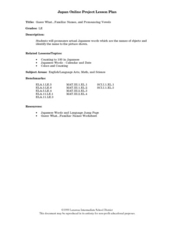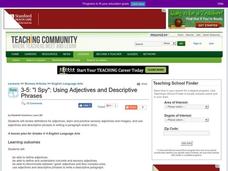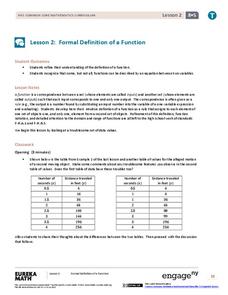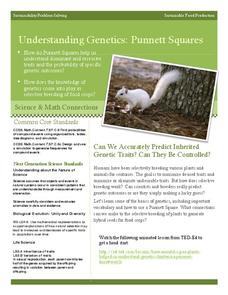Urbana School District
Thermodynamics
Entropy, it isn't what it used to be. Presentation includes kinetic-molecular theory, heat and internal energy, thermal equilibrium, temperature scales, laws of thermodynamics, entropy, latent heat of fusion, specific heat, calorimetry,...
Mathematics Vision Project
Module 6: Trigonometric Functions
Create trigonometric functions from circles. The first lesson of the module begins by finding coordinates along a circular path created by a Ferris Wheel. As the lessons progress, pupils graph trigonometric functions and relate them to...
Curated OER
Liquid Rainbow
Students develop their own techniques for drawing a small sample of solutions into a straw. They hypothesize ways to increase the density of water, and discuss how salt-free rainwater tends to float on top of salty seawater.
Curated OER
Japan Online Project Lesson Plan
Give your class this introductory activity to spark interest in the Japanese language. Learners look at the Japanese vowels and practice their pronunciation. Then the class works to match vocabulary words to their visual representation.
Exploratorium
Eddy Currents
Make electromagnetic eddy currents evident with this demonstration. You will need to gather a few materials from the local hardware store and a strong neodymium magnet, but the visual value is well worthwhile.
Scholastic
Groundhog Day
A simple activity for a simple, but special, holiday. Young learners read a brief history of Groundhog Day, practice reading aloud, and then discuss how shadows are formed.
Soft Schools
Interpreting Metaphors in Shakespeare
"All the world's a stage, and all the men and women merely players." Shakespeare provides the examples on this worksheet that asks readers to identify the two things being compared and to explain the characteristics the two share.
Curated OER
"I Spy": Using Adjectives and Descriptive Phrases
Young scholars define adjectives and use adjectives and descriptive phrases to write a descriptive paragraph. They write a description of a sensory item, and read and discuss a five senses chart. Students then complete a chart using...
Curated OER
Stochastic and Deterministic Modeling
Explore the difference between stochastic and deterministic modeling through programming. First have the class write algorithms for relatively simple tasks using pseudocode. Use the Python 2.7 program app to simulate Mendel's Pea Pod...
Premier Literacy
Point of View
Incorporate technology into a literature lesson with an innovative language arts lesson. Middle schoolers read an electronic version of original stories or fairy tales, and after determining the point of view, rewrite the tale from...
Laboratory for Atmospheric and Space Physics
Where Are We Going?
Come take a ride on the space bus! Scholars go on an imaginary trip to pick up their peers from the inner and outer planets while reinforcing math skills. First, learners round decimals to identify each planets' distance from Earth....
EngageNY
The Motion of the Moon, Sun, and Stars—Motivating Mathematics
What does math have to do with the behavior of the earth and sun? Learn how the movement of celestial bodies has influenced the development of trigonometry. Scholars connects the details in mathematics to their...
K12 Reader
Identifying Geometric Solids
After reading a short passage that identifies different types of geometric solids, kids answer a series of questions using information found in the article.
Curated OER
Tiles, Blocks, Sapphires & Gold: Designing a Treasure Map
Young cartographers in groups hide treasure at school and then create a map to find it using pattern blocks and tiles. They make paintings with clues to create a visual representation of the location of their treasure. Groups present...
Forest Foundation
Fire - How Does it Relate to You?
Forest fires can be a necessary step in keeping a forest healthy, but what happens when they get out of control? Learners investigate the causes and effects of forest fires in two specific areas, culminating in a report about the ways...
Exploratorium
Touch the Spring
Concave mirrors and the images they produce are traditional topics in the physics classroom. This resource explains how to set up an investigation of them, and it provides you with the explanation of concepts.
University of Utah
Geometry Part 2: Measurement in 2- and 3-Dimensions, Plane Sections of Solids
What kind of tree does a math teacher climb? A geometry! Here is a lesson that includes all the geometry resources you could ever wish for in one comprehensive workbook. Class members demonstrate what they have learned by...
EngageNY
Formal Definition of a Function
Formalize the notion of a function. Scholars continue their exploration of functions in the second lesson of the module. They consider functions as input-output machines and develop function rules for selected functions.
Curated OER
Recognizing Litter
When does trash become litter? Use this litter awareness lesson to help them understand the importance of trash disposal. Get learners engaged by reading Nancy Loewen's Lady Lulu Liked to Litter (not included). After discussing what...
Mathematics Assessment Project
Designing a 3d Product in 2d: a Sports Bag
Sew up pupil interest with an engaging, hands-on lesson. Learners first design a sports bag given constraints on the dimensions of fabric. They then evaluate provided sample responses to identify strengths and weaknesses of included...
Mathematics Assessment Project
Modeling Motion: Rolling Cups
Connect the size of a rolling cup to the size of circle it makes. Pupils view videos of cups of different sizes rolling in a circle. Using the videos and additional data, they attempt to determine a relationship between cup...
Teach Engineering
Cell Membrane Color Sheet and Build a Cell Membrane
A cell of another color is still a cell. Pupils color a cell to identify its structures in the fourth segment of a seven-segment series. Groups work together to build a three-dimensional cell membrane segment, which is combined with...
Curated OER
From Light to Dark and Back
Experiment with light and dark in a series of interactive activities that lead up to reading and writing poetry. Class members have the opportunity to observe their feelings while sitting in the light and dark and to play with shadow...
Western Kentucky University
Understanding Genetics: Punnett Squares
Can scientists really predict genetic outcomes or are they simply making a lucky guess? Scholars first learn about Gregor Mendel and how to make Punnett squares. Then they extract DNA from a strawberry in a lab with included conclusion...























